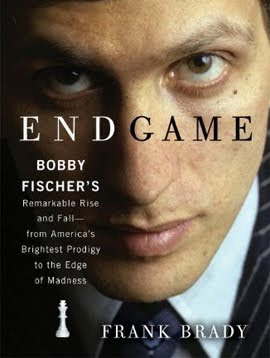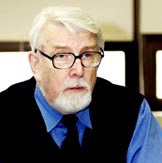 In the United States, chances are that Americans can name just one world class chess player. His name is Bobby Fischer, and he is widely regarded as the greatest chess player of all time.
In the United States, chances are that Americans can name just one world class chess player. His name is Bobby Fischer, and he is widely regarded as the greatest chess player of all time. Such acclaim doesn't always come freely as the title of the newest book on Bobby Fischer's life. Endgame: Bobby Fischer’s Remarkable Rise And Fall From America’s Brightest Prodigy To The Edge of Madness (Endgame) is exactly as it sounds.
The unlikely makings of a world chess champion.
When they were children, Fischer and his older sister taught themselves how to play chess. But as time went on, she grew bored with the game while he went on to read every book he could find on the subject. Then he ventured out into New York City to try his hand and absorb what he could.
Fischer’s mother, Regina, did what she could to introduce her son to other hobbies and sports, and he was quite proficient at some (such as swimming and tennis). School studies were different. He was a mediocre student, thinking only of chess. His mother, perhaps sensing his brilliance, eventually helped to connect him with seasoned players who might take the boy under their wing or at least give him a challenge.
In a matter of just a few years, Fischer became a chess master.
In Endgame, author Frank Brady does an outstanding job chronicling Fischer’s life. He debunks many urban legends, myths and untruths while revealing a highly credible side of the chess champion that most never knew existed.
Fischer may have transitioned from the emotional kid who cried when he lost into a swaggering, confident champion, but hidden behind the brilliance and confidence were a slew of insecurities and eccentricities. These would be his downfall.
Fischer could be kind, but he could also be cruel, casting people out of his life if he felt they had betrayed him or if he felt threatened in any way. He also had no hesitation in making outrageous demands of tournament organizers, asking for far more money than what the prize purse might have been, free hotel accommodations, specific lighting, specific chairs.
What sometimes looked like monetary greed might have masked a insecurity. For all the bickering he did to demand more prize money, he routinely turned down lucrative offers to lend his name to products and endorsements. He also turned down an opportunity to play for $5 million, a decision he surely regretted in later years.
It is almost impossible to understand why that as Fischer progressed, he became anti- American and anti-Semitic in his beliefs. But this growing hostility would eventually lead him to be jailed in Japan without a valid passport. He could no longer turn to the U.S. for help. He was wanted for tax evasion and violating international sanctions (for playing a tournament in Yugoslavia).
He was eventually released after being granted citizenship in Iceland. His health failing, Fischer died three years ago, pretty much alone.
A few moves about author Frank Brady
 Brady is currently the chairman of the department of mass communications, journalism, television and film at St. John's University, New York. But prior to his position and teaching there, Brady was the founding editor of Chess Life magazine.
Brady is currently the chairman of the department of mass communications, journalism, television and film at St. John's University, New York. But prior to his position and teaching there, Brady was the founding editor of Chess Life magazine.Although Brady went on to serve as editor of several major publications, his passion for chess led to him to become an international arbiter. He has also directed many major chess tournaments and served as secretary of the United States Chess Federation for two years. He has written several books and his previous Fischer biography, Bobby Fischer: Profile of a Prodigy, was a best seller.
Endgame by Frank Brady Checkmates An 8.8 on the Liquid Hip Richter Scale.
Another interesting note about Brady is that he was one of Fischer’s long-time friends. It's this interesting bit of trivia that makes his insight and understanding of chess and the culture surrounding the game an additional win for the book.
Brady was there, and when he wasn't there he earned enough experience in the game to provide a compelling read about it, as well as the interesting lives people lead behind it. As an additional point of interest, it reveals how different cultural backgrounds weigh heavily on shaping the play of the game. Sometimes it reads as if the players were competing in a boxing ring.
Endgame: Bobby Fischer's Remarkable Rise and Fall - from America's Brightest Prodigy to the Edge of Madness is available on Amazon on Feb. 1, 2011. This review is based on an unedited advance copy of the book from Crown.
![Liquid [Hip]](https://blogger.googleusercontent.com/img/b/R29vZ2xl/AVvXsEjAFBQPqS7J0-rrttNoRYSsuwIePPZf4Nq6sqDioK1zzVQXJIQXKzq_NVNI4n6h3inuRQFBKOcJeZeSufkdHHIOxbSWyBjTjTxgKEQGyPzdwvkEEeECh4bI5YEGk4RWGUINSd7vulPQsCA/s1600-r/liquidhip.jpg)